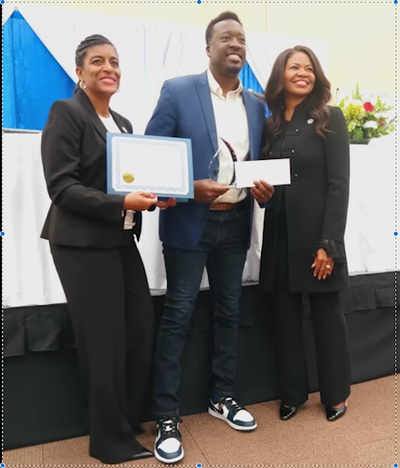On Saturday, Oct. 19, under the leadership of Chauné Fitzgerald, founder and CEO of the Washington African American Chamber of Commerce (WAACOC), the Black Business Forum and Expo took place in Kennewick, WA. According to their website, the WAACO “is a membership-based organization that provides networking opportunities, business resources, and advocacy for local businesses in the waacoc.com area.” The mission of the organization “is to promote economic growth and community development by supporting the interests” of its members.
Dozens of business owners, non-profit organizations, and industry experts were in attendance. Mike Pellicciotti, the Washington State Treasurer also showed support. The panel, moderated by Joel Nania, the Small Business Administration Branch Manager for Spokane, included Ana Ruiz Kennedy (Craft 3), Jessie Johnson, (WA Treasury Office), and Jacquelynne Sandoval, (Spokane realtor).
Entrepreneurship is one avenue toward building generational wealth, and successful outcomes happen when the right tools are readily available and clearly outlined. Due to lack of exposure, Black business owners navigate uphill oftentimes. Sandoval shared insights about Black entrepreneurship.
“It’s important because they’re bringing the tools that we didn’t even realize were there,” Sandoval said.
On the panel, Sandoval discussed access to capital when starting and operating a business. She highlighted owning versus renting, understanding profit and loss, realizing the weight of your personal credit score when just starting out, and pinpointing where to find small business loans and grants. For instance, the Linked Deposit Program was created when the Minority and Women Owned Business Assistance Act was passed in 1993.
“Linked Deposit is something where banks are given money specifically to loan to minority businesses and with this program, you can go onto the website and find which banks they are; they literally have money that is sitting there for us,” Sandoval said.
Sandoval said it is important to keep your business mission and vision front and center, in addition to having a strong business plan as reinforcement. Having statistics and data to back up your business production and activity are also paramount in telling your entrepreneurship journey.
“Nobody is going to loan you anything if you do not have a solid plan,” she said.
She said that being an entrepreneur is a process of continual learning.
“You need to tell them why you’re not as much of a risk,” Sandoval said. “We did talk about how you have to keep going and you need to educate yourself. It does give us a voice. It gives us power when we are owning our own things.”
She shared that there seems to be a knowledge and opportunity gap when it comes to Black entrepreneurship in Spokane, with the bulk of the information going to larger cities on the west side of the state. Calling it the great state divide, Sandoval wants to see Spokane’s 2% Black population grow. She stresses the importance of mentorship. On the matter of generational wealth, she says that we build community wealth when we have businesses for the next generation to pick up.
“Don’t gatekeep the information that you know,” Sandoval said. “Become a mentor. Bring somebody else in so this way we can do it; they talked about how there’s some businesses that people have owned for a long time, but they legitimately just closed because there’s nobody there to keep that place going.”
One last word of advice for those who want to venture into owning their own business: “Write your plan out. Write your vision and make it plain. You need to know what your vision is. What are you trying to do? Start doing it on a small scale and know that it takes time.”
The Black Lens looks forward to highlighting more local entrepreneurs in upcoming issues.
